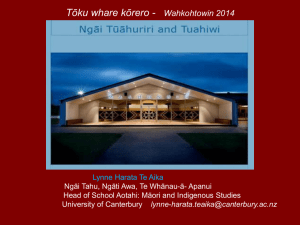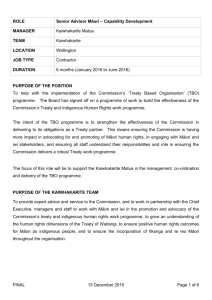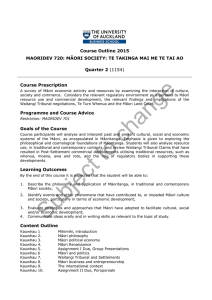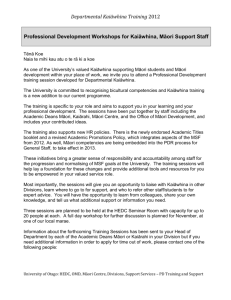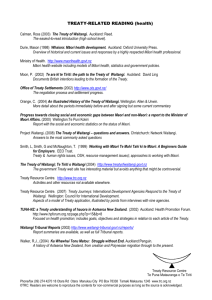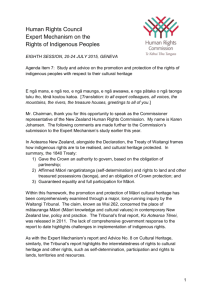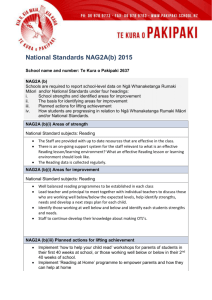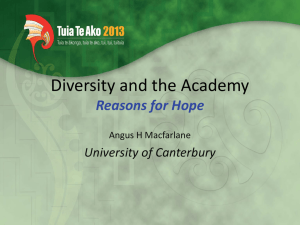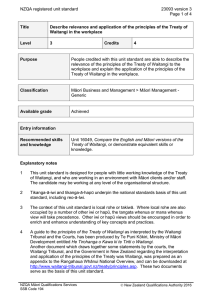Form 1 - University of Otago
advertisement
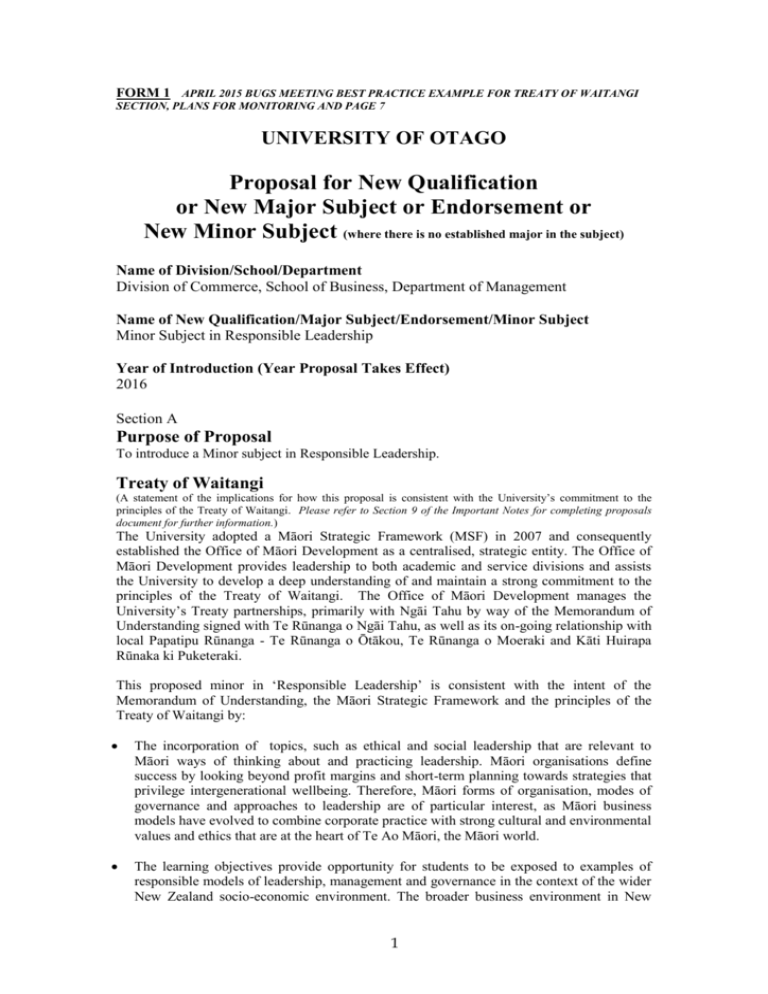
FORM 1 APRIL 2015 BUGS MEETING BEST PRACTICE EXAMPLE FOR TREATY OF WAITANGI SECTION, PLANS FOR MONITORING AND PAGE 7 UNIVERSITY OF OTAGO Proposal for New Qualification or New Major Subject or Endorsement or New Minor Subject (where there is no established major in the subject) Name of Division/School/Department Division of Commerce, School of Business, Department of Management Name of New Qualification/Major Subject/Endorsement/Minor Subject Minor Subject in Responsible Leadership Year of Introduction (Year Proposal Takes Effect) 2016 Section A Purpose of Proposal To introduce a Minor subject in Responsible Leadership. Treaty of Waitangi (A statement of the implications for how this proposal is consistent with the University’s commitment to the principles of the Treaty of Waitangi. Please refer to Section 9 of the Important Notes for completing proposals document for further information.) The University adopted a Māori Strategic Framework (MSF) in 2007 and consequently established the Office of Māori Development as a centralised, strategic entity. The Office of Māori Development provides leadership to both academic and service divisions and assists the University to develop a deep understanding of and maintain a strong commitment to the principles of the Treaty of Waitangi. The Office of Māori Development manages the University’s Treaty partnerships, primarily with Ngāi Tahu by way of the Memorandum of Understanding signed with Te Rūnanga o Ngāi Tahu, as well as its on-going relationship with local Papatipu Rūnanga - Te Rūnanga o Ōtākou, Te Rūnanga o Moeraki and Kāti Huirapa Rūnaka ki Puketeraki. This proposed minor in ‘Responsible Leadership’ is consistent with the intent of the Memorandum of Understanding, the Māori Strategic Framework and the principles of the Treaty of Waitangi by: The incorporation of topics, such as ethical and social leadership that are relevant to Māori ways of thinking about and practicing leadership. Māori organisations define success by looking beyond profit margins and short-term planning towards strategies that privilege intergenerational wellbeing. Therefore, Māori forms of organisation, modes of governance and approaches to leadership are of particular interest, as Māori business models have evolved to combine corporate practice with strong cultural and environmental values and ethics that are at the heart of Te Ao Māori, the Māori world. The learning objectives provide opportunity for students to be exposed to examples of responsible models of leadership, management and governance in the context of the wider New Zealand socio-economic environment. The broader business environment in New 1 Zealand includes the Treaty of Waitangi and the obligations of leaders and managers of organisations to engage appropriately with tangata whenua. Plans for Monitoring Programme Quality (A clear statement of provisions for monitoring quality, including teaching quality; reviewing regulations, content and delivery; reviewing whether papers should be added or deleted. Such provisions should include the establishment of a small monitoring group to collect information in respect of student numbers, pass rates, retention, and student satisfaction, to prepare any peer or self-review reports and to compile the Graduating Year Review.) Monitoring of the programme includes: 1. Monitoring demand for the minor 2. Student representatives appointed in each paper in the minor provide feedback on a regular basis 3. Annual consultation with the School of Business 4. Regular course evaluations 5. Regular departmental examination board meetings 6. Monitoring of student numbers, pass rates, retention and student satisfaction by the Management Department 7. The Business School has an assurance of learning process which evaluates student learning on key programme goals and objectives, aligned with the graduate profile, with the aim of improving student learning 8. Routine reviews by the University of Otago’s Quality Advancement Unit. 9. The University of Otago’s annual Student Opinion and Graduate Opinion Surveys which provide student experience and satisfaction data, and information about further study and employment outcomes. 10. International accreditation of the Business School provides a means for comparing and benchmarking schools and their programmes on an international scale. Proposed Teaching/Delivery Methods (An overview statement which should describe any distinctive features of delivery and also comment on inclusion of practical applications, e.g. inclusion of a clinical component.) The Department of Management will oversee the administration of the Minor. Teaching and delivery methods will be as per the existing papers that comprise the Minor. A brief synopsis of these papers is provided below: Compulsory: BSNS105 Management and Organisations This paper develops understanding of the individual and group behaviour, communications, and the management of operations and human resources within organisations. MANT250 Managing People This paper is about the theory and practice of the management of people and their behaviour in organisations, from entry, to motivation, relationships, contributions, expectations and exit. MANT252 Developing Responsible Leadership This paper is an introduction to ethically responsible leadership with a focus on selfawareness of students’ own values, strengths and weaknesses, and on developing skills through practical exercises and a social action project. MANT330 Leadership This paper improves leadership ability by reflexively applying contemporary theories of leadership that emphasise building sustained relationships based on internal values to effect change. Recommended: 2 MANT331 Business Ethics This paper focuses on ethical issues in business including ethical theory and reasoning, nature and evolution of the business system, internal and external constituencies, and an examination of ethical functioning in business. Options: MANT222 Interpersonal/International Business Communication This paper provides a critical understanding of communication theory, processes and techniques at organisational, managerial and personal levels. It also provides a framework for the development of practical communication skills in organisational settings. MANT337 Organisations and Sustainability Examines how businesses are responding to sustainability and climate change in the current socio-economic context, and encourages students to create alternative scenarios of future business worlds. MANT343 Negotiation and Dispute Resolution Study of the theory and concepts of negotiation and of mediation as an alternative dispute resolution mechanism, and the development of practical negotiation and mediation skills for application in business and management systems. MART305 Societal Issues in Marketing The relationships between marketing, public policy and social and environmental values are examined with reference to legal issues. 3


